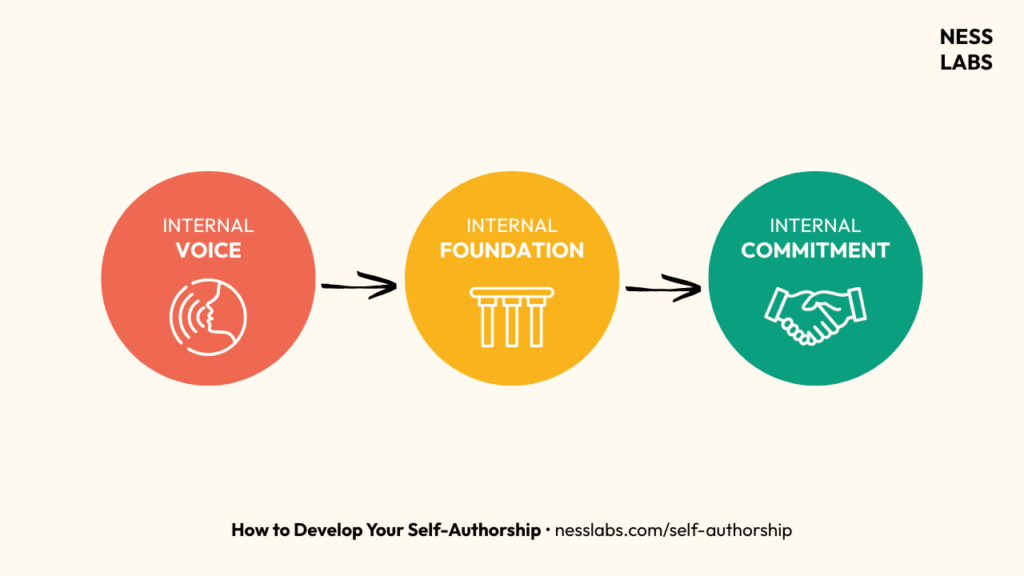Have you ever made a decision that looked right on paper but felt wrong in your gut? Or found yourself following rules simply because that’s what you were taught, not because they align with who you are today?
If so, you’ve experienced the tension between external expectations and your own internal compass.
Self-authorship is the ability to navigate that tension by not only making decisions based on your current values rather than external expectations, but also by actively developing those values through conscious reflection.
In more academic terms, educational researcher Baxter Magnolia defines self-authorship as “the capacity to internally define a coherent belief system and identity that coordinates mutual relations with others.”
Research shows that strong self-authorship leads to better performance, stronger critical reasoning, clearer cognitive thinking, and improved motivation. Instead of pursuing goals based on societal expectations, self-authorship allows you to explore ambitions that genuinely matter to you. It’s a powerful skill for living, but it’s challenging to master.
How to develop your self-authorship
You might be operating from external rather than internal authority if you:
- Often ask others what you “should” do before considering your own view
- Feel anxious or resentful about choices you’ve made to please others
- Have made decisions based on what looks good rather than what feels right
Developing self-authorship allows you to more consistently express your own internal sense of authority. Researchers have identified three main phases to achieve full self-authorship:

1. Trust your internal voice. Instead of reacting automatically to situations based on past conditioning, start by actively listening to your internal voice to shape your response. What this looks like is pausing to ask: “What do I actually think about this?”
2. Build an internal foundation. Consciously combine your identity, relationships, beliefs, and values into a coherent set of internal commitments. This phase involves examining what you truly believe versus what you’ve absorbed from others.
3. Secure internal commitment. When external pressures arise, consistently use your commitments to guide decisions rather than defaulting to others’ expectations. This is the phase where self-authorship becomes a lived practice rather than just an idea.
Be patient. Developing self-authorship can take years to reliably use your internal commitments to guide decisions without automatically reacting to external events.
In addition, several obstacles can make it harder to develop your self-authorship: cultural pressures such as living in environments where conformity is heavily valued over individual expression, fear of judgment such as worrying that others will disapprove if you make choices that don’t align with their expectations, or…
… just plain habits, such as continuing patterns established in childhood without examining whether they still serve you. So, how can you make it a little bit easier to develop your self-authorship?
Supporting your self-authorship
Studies point to a few different activities that have been shown to help people develop their self-authorship. A good approach is to experiment and see which ones help you best develop and secure your own set of internal commitments.
- Question your values and beliefs: Instead of taking your values for granted, actively examine them. Ask yourself: What do I genuinely believe? Are these truly my values, or did I inherit them without question? This sounds simple but requires real courage, as questioning fundamental beliefs can feel destabilizing.
- Engage with diverse perspectives: Connect with people who may have different experiences from yours. This increases your awareness and understanding while helping you develop your own values, either by inspiring new beliefs or clarifying existing ones through contrast.
- Take responsibility for your growth: Recognize that you’re in charge of your learning and development. Everything you engage with shapes your values and identity. While you can’t control external events, you can control what you read, watch, listen to, and whom you spend time with.
Developing your self-authorship requires some effort, but the journey itself will help you understand yourself more deeply. The idea isn’t to become completely independent of others’ input, but to develop a strong enough internal foundation that you can genuinely choose which external influences to incorporate into your decision-making.
As you strengthen your self-authorship, you’ll find that your choices now feel more aligned with who you are, your relationships become more authentic, and you develop a greater sense of agency when facing life’s inevitable challenges. That seems worth investing in.
